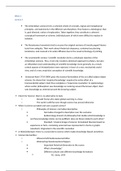Samenvatting
Summary Philosophy of the Humanities: English Language & Culture
- Instelling
- Universiteit Van Amsterdam (UvA)
This is a complete summary of the articles, powerpoints, and the lecture notes, as well as the seminars. It also contains the correct answers for the assignments from week 1 - 7. This summary is for the compulsory course Philosophy of the Humanities.
[Meer zien]





